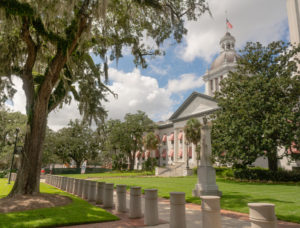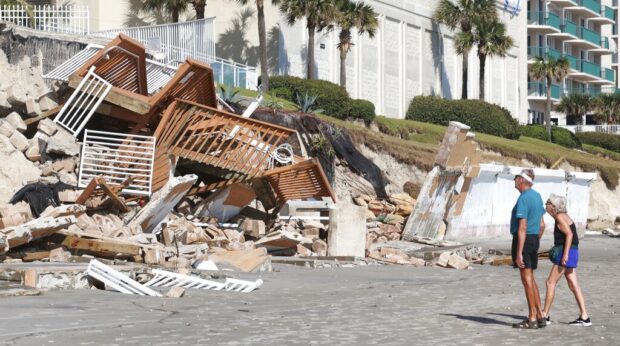Florida legislative leaders posted a proclamation Tuesday painting the broad outlines of the special session scheduled to begin Monday, Dec. 12. And it quickly had tongues wagging around the industry.
As expected, the proclamation from Sen. President Kathleen Passidomo and House Speaker Paul Renner notes that the five-day session will consider ways to reduce the cost of property insurance claims litigation, improve the availability of reinsurance, limit assignment-of-benefits agreements, and reduce the size of the state-created Citizens Property Insurance Corp.
But the agenda also included some curious items that some in the insurance industry may not have been expecting, including legislation to:
- Improve claims-handling practices
- Increase oversight of property insurance market participants
- Prescribe property insurance requirements regarding alternative dispute processes, coverage options and agent practices.

Reforming Florida’s one-way attorney fee statute has been much discussed as the top need to prevent more insurance insolvencies and stem the need for more increases in homeowner premiums. But some insurance lobbyists, executives and consultants said Tuesday that lawmakers are keen to show that the session will not be seen as an insurance industry rescue party, and will examine some consumer-friendly changes.
Those could include shortening the time that insurers have to deny or accept claims, said Kevin Comerer, a registered lobbyist with Rubin Turnbull & Associates and a former legislative director with American Integrity Insurance Co.
Florida now allows up to 90 days in most claims. But some states, such as Louisiana, provide a hard deadline of 30 days, said William Stander, of the Florida Property and Casualty Association.
The session is “going to keep the focus on consumers,” Stander said.
Others have said that the proclamation item could mean that lawmakers will move to limit the role of public adjusters in the claims-filing, as Florida Chief Financial Officer Jimmy Patronis has called for.
The agenda item regarding more oversight of insurers may translate into giving the Office of Insurance Regulation more authority or more flexibility. That could mean giving OIR more tools to oversee managing general agents and their transactions with affiliate companies, said Michael Carlson, president of the Personal Insurance Federation of Florida.
At the May special session on the insurance crisis, a number of Democrat lawmakers argued that some insurance companies were facing financial difficulty partly because premium revenue had been diverted to their MGAs. Insurers and advocates have said that isn’t accurate and that such an arrangement would be counter-productive for carriers.
The bullet point on alternative dispute resolutions and “agent practices” is probably referring to a plan to codify a recent endorsement from American Integrity Insurance. The Tampa-based insurer earlier this year made waves when it produced an endorsement for homeowner policies — later approved by OIR — offering premium discounts if policyholders agree to send claims disputes to binding arbitration instead of into litigation.
Legislative leaders may be planning to make it easier for other insurers to adopt similar endorsements, and may spell out insurers’ and insurance agents’ responsibilities for that, said Kyle Ulrich, president of the Florida Association of Insurance Agents.
At the Florida Chamber of Commerce Insurance Summit in Orlando, state Insurance Commissioner David Altmaier on Tuesday did not give an indication of what the proclamation items may mean. But he urged the insurance industry to unite behind a limited but clear set of goals for the session.

“Let’s keep our eye on the ball, so to speak,” Altmaier said. “Let’s continue working for that thing that we’ve all been working for for a really, really long time and be careful about hanging too many things on the tree and causing the whole thing to tip over.”
There’s a perception, Altmaier said, that the industry never seems to know what it wants and insurers are often asking for different reforms.
It’s not clear if Florida Gov. Ron DeSantis is supportive of the legislative leaders’ agenda. His office did not post a statement about it Tuesday.
Florida law allows three methods by which a special session can be convened: The governor can call a session; legislative leaders can issue a proclamation; or 60% of the lawmakers can agree.
At the first insurance special session in May, legislative leaders and the governors’ office agreed on two bills, which were published just a few days ahead of the session and saw few changes during deliberations.
Drafts of bills for the Dec. 12 session are expected to be made public later this week.
By listing several items in the proclamation, lawmakers may be trying to limit the scope of what can be discussed. That could change, though. Florida’s supermajority of Republicans could vote to amend the rules and add new items at the last minute, Comerer said.
The session also will consider property tax relief and other financial assistance “related to damages resulting from Hurricanes Ian and Nicole,” and additional mechanisms to support the Division of Emergency Management in its disaster response efforts.
(This article was previously published by Insurance Journal. Reporter Will Rabb is the Southeast Editor of Insurance Journal.)
(Top photo: Joe Burbank/Orlando Sentinel via AP)





















 The Future of HR Is AI
The Future of HR Is AI  Why Claims AI Build vs. Buy Decisions So Often Miss the Mark
Why Claims AI Build vs. Buy Decisions So Often Miss the Mark  New Texas Law Requires Insurers Provide Reason for Declining or Canceling Policies
New Texas Law Requires Insurers Provide Reason for Declining or Canceling Policies  State Farm Inked $1.5B Underwriting Profit for 2025; HO Loss Persists
State Farm Inked $1.5B Underwriting Profit for 2025; HO Loss Persists 




